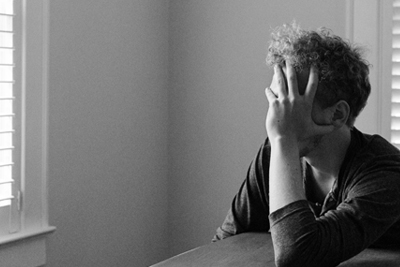Risk Factors and Warning Signs of Suicide
What Leads to Suicide?
There’s no single cause for suicide. Suicide most often occurs when stressors and health issues converge to create an experience of hopelessness and despair. Depression is the most common condition associated with suicide, and it is often undiagnosed or untreated. Conditions like depression, anxiety and substance problems, especially when unaddressed, increase risk for suicide. Yet it’s important to note that most people who actively manage their mental health conditions go on to engage in life.
Suicide Warning Signs
Something to look out for when concerned that a person may be suicidal is a change in behavior or the presence of entirely new behaviors. This is of sharpest concern if the new or changed behavior is related to a painful event, loss, or change. Most people who take their lives exhibit one or more warning signs, either through what they say or what they do.
Talk
If a person talks about:
- Killing themselves
- Feeling hopeless
- Having no reason to live
- Being a burden to others
- Feeling trapped
- Unbearable pain
Behaviors that may signal risk, especially if related to a painful event, loss or change:
- Increased use of alcohol or drugs
- Looking for a way to end their lives, such as searching online for methods
- Withdrawing from activities
- Isolating from family and friends
- Sleeping too much or too little; Fatigue
- Visiting or calling people to say goodbye
- Giving away prized possessions
- Aggression
Mood
People who are considering suicide often display one or more of the following moods:
- Depression
- Anxiety
- Loss of interest
- Irritability
- Humiliation/Shame
- Agitation/Anger
- Relief/Sudden Improvement
Suicide Risk Factors
Risk factors are characteristics or conditions that increase the chance that a person may try to take their life.
- Health Factors
- Mental health conditions
- Depression
- Substance use problems
- Bipolar disorder
- Schizophrenia
- Personality traits of aggression, mood changes and poor relationships
- Conduct disorder
- Anxiety disorders
- Serious physical health conditions including pain
- Traumatic brain injury Environmental Factors
- Access to lethal means including firearms and drugs
- Prolonged stress, such as harassment, bullying, relationship problems or unemployment
- Stressful life events, like rejection, divorce, financial crisis, other life transitions or loss
- Exposure to another person's suicide, or to graphic or sensationalized accounts of suicide
Historical Factors
- Previous suicide attempts
- Family history of suicide
- Childhood abuse, neglect or trauma
Emergency Contact Numbers and Resources
The following are resources for in and outpatient facilities along with emergency contact information.
Please note, the facilities listed below are in the vicinity of RCBM's physical location. The following link contains resources for all outlying areas of Michigan:
https://en.wikipedia.org/wiki/List_of_hospitals_in_Michigan
National Suicide Prevention Lifeline / Crisis Text Line
1- (800)-273-8255 / Text HELLO or HOME to 741741
Provides 24/7, free and confidential support for those who are in suicidal crisis or emotional distress. Inpatient - Child and Adolescent
∙ Harbor Oaks Hospital, New Baltimore: (586)-725-5777; 24-hour crisis line: (800)-537-7924
∙ Havenwyck Hospital, Auburn Hills: (248)-373-9200 or (800)-401-2727
Inpatient – 18 and Up
∙ Beaumont Hospital Psychiatric Services, Royal Oak: (248)-551-9800
∙ Crittenton Hospital Psychiatric Intake, Rochester: (248)-652-5200 or (248)-652-5797
∙ Harbor Oaks Hospital, New Baltimore: (586)-725-5777; 24-hour crisis line: (800)-537-7924
∙ Havenwyck Hospital, Auburn Hills: (248)-373-9200 or (800)-401-2727
∙ St. Joseph’s Hospital, Pontiac: (248)-858-3623
∙ St Joseph’s East, Mt. Clemens: (586)-466-9740
Inpatient – Geriatric
∙ Botsford Hospital Psychiatric Services, Farmington Hills: (248)-471-8723
∙ St. Joseph’s East, Mt. Clemens: (586)-566-974
Common Ground Sanctuary
Crisis Line: (800)-231-1127 Provides 24-hour assistance including safe shelters and residential treatment programs for youth and adults; Administrative Office: (248)-456-8150
The Behavioral Center of Michigan
4050 East 12 Mile Road., Warren, MI 48092; Intake: (866)-673-3100
Local Police, Non-Emergency:
Rochester Police Department: (248)-651-9621
Auburn Hills Police Department: (248)-370-9444
Troy Police Department: (248)-524-3477
Rochester Hills Police Department (Oakland Country Sheriff): (248)-537-3530
Download pdf of Emergency Contact Numbers and Resources here
RCBM’s Stance on Guns and Mental Illness/Psychological Distress
Gun control has been a heated and divisive topic for our nation, but RCBM's views on this subject are unwavering. We believe that it is an unnecessary risk for individuals with mental illness to have access to guns.
Symptoms of mental illness vary from one individual to the next. We believe that access to guns is contraindicated in individuals with a history of any of the following symptoms:
- Difficulty thinking clearly
- Impulse dyscontrol
- Suicidal ideation and/or a past suicide attempt
- Homicidal ideation
- Anger issues and/or violent tendencies
- Hopelessness
- Psychosis (hallucinations, delusions)
- Carrying a vendetta against another person or entity
We have heard tragic stories of individuals gaining access to guns thought to be secured, so it is our opinion that locking guns away is not enough.
Ultimately, it is up to patients and their families to have this conversation and make the appropriate decisions. We urge you to make SAFETY your highest priority.
Read more information here about risk and protective factors for youth violence.
Other Resources for Parents and Families
Holding on to life toolkit
https://www.mcspc.org/ToolKit.html
SPRC: What Clients and Families Need to Know.
https://www.sprc.org/sites/default/files/Handout-WhatClientsOrFamilies.pdf
Following are some facts and several simple steps to help you, or a loved one, make it safely through a suicidal crisis.
School Shooting Resources:
https://www.nctsn.org/what-is-...
When Someone Is at Risk for Suicide
How to talk to someone who may be struggling with depression, anxiety, or suicidal ideation.
Have an honest conversation
If you think someone is thinking about suicide, assume you are the only one who will reach out. Here’s how to talk to someone who may be struggling with their mental health.
Talk to them in private
- Listen to their story
- Tell them you care about them
- Ask directly if they are thinking about suicide
- Encourage them to seek treatment or to contact their doctor or therapist
- Avoid debating the value of life, minimizing their problems or giving advice
If a person says they are considering suicide
- Take the person seriously
- Stay with them
- Help them remove lethal means
- Call the National Suicide Prevention Lifeline: 1-800-273-8255
- Text TALK to 741741 to text with a trained crisis counselor from the Crisis Text Line for free, 24/7
- Escort them to mental health services or an emergency room
This information was obtained from the following sources:
American Foundation for Suicide Prevention. (2019). Risk factors and warning signs.
American Foundation for Suicide Prevention. (2019). When someone is at risk. Retrieved from: https://afsp.org/find-support/...












